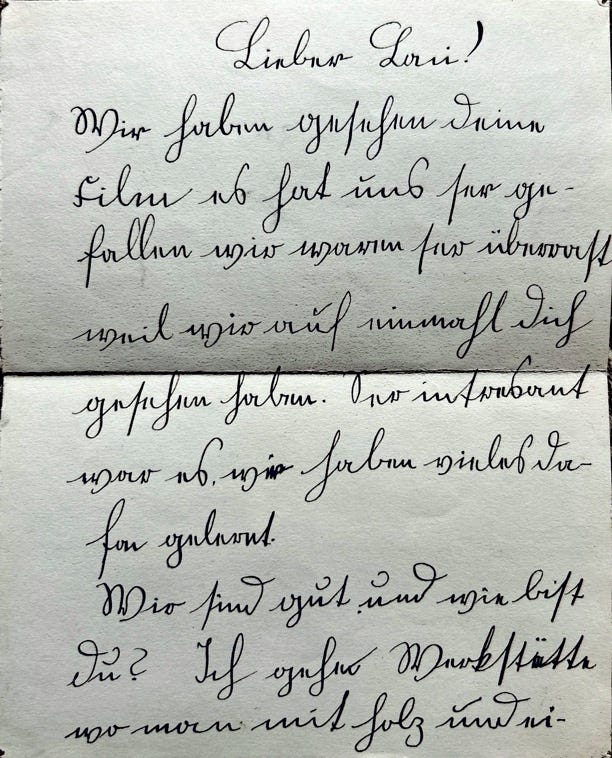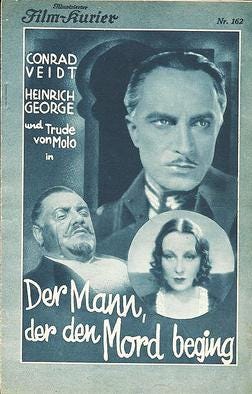Brothers, Part 2
German Sütterlin Script & the Berlin Film industry
One of the letters in Laci’s archive caught me by surprise — not because of the content, but because of the handwriting. I was carefully going through a pile of letters containing Opapa’s childhood missives to his older brother, and they were all — predictably — written in Hungarian, Opapa’s native language. I can’t read Hungarian, and while I now recognize certain words, I generally have no idea what these letters say until I send them to my translator.
Then, I picked up a document that I was shocked to realize I could read: it was this letter, which is written in a careful German Sütterlin script:
This was a delightful surprise for me because one of my more obscure research skills as a historian is that I can read Sütterlinschrift — an archaic form of German handwriting that was banned in 1941 by the Nazi party in favor of Latin script, which is still used today. In Sütterlinschrift, the alphabet is written with different symbols than in the current script used for German.
I learned how to read and write Sütterlinschrift — or, more precisely, the 17th-18th century version of it, which is called Kurrent — while I was in graduate school. I took a German Script course at the Moravian Archives in Bethelehem, PA, one of just two places that teaches German Kurrent in the US today. I continue to use Kurrent today in my research about the 18th century: in another research project I am currently working on, I am reading 18th c. German missionary diaries from Jamaica to write about the history of slavery and religion in the Caribbean.
Hopefully this context explains why it was especially fun to see Sütterlinschrift in my grandfather’s handwriting. Who knew that this obscure skill would be helpful in reading letters from my Hungarian grandfather! It was, among other things, a surprising source of connection between us. It also made it easier to read his letter! I did find a few small errors in Opapa’s German, but it is pretty good. I’m impressed.
Here is a translation of the letter. :
Dear Laci!
We saw your film and we liked it a lot. We were surprised because we saw you once. It was very interesting and we learned a lot from it.
We are good how are you? I go to a workshop where they work with wood and iron. What films are you working on now[?] Please write to me again when you are playing another Film. Now we send you heartful greetings and lots of kises.
Your brother Gyuri.
Viola, I send a thousand kisses and I will write to you soon in German.
The content of the letter is pretty interesting as well. In it, we learn that Laci has been working on a film that was shown in Budapest. Unfortunately, my grandfather did not date his letter (argh!) and even though we have the envelope, the stamp with the date has been torn off:
From the envelope, we do at least learn Laci’s address: he is living in Berlin, in the Dahlem neighborhood.
Based on this information, I looked up Laci’s activities in the Berlin film industry. There are a number of films Opapa could be referring to in his letter. In 1927, Laci was the cinematographer for Die Geliebte, a silent film shot in the Terra Film studios in Berlin. Two years later, he was the assistant director for Die Große Sehnsucht, shot at the EFA studios in Berlin. Then, in 1931, Laci was assistant director and editor for Der Mann, der den Mord beging (The Man Who Murdered), a crime drama shot at the Babelsberg Studios in Potsdam, on the outskirts of Berlin. Laci continued to work in Berlin until 1933, when the Nazis came to power.
So, which of these films did Opapa see? Since we don’t have a date, we have to go by context: Opapa mentioned in his letter that he “saw” Laci in the film. Did Laci have a cameo in one of the films?
I turned to Laci’s Archive to figure this out. My guide was Laci’s own short memoir — an essay he wrote toward the end of his life, entitled “Encounter with a Young Man.” In it, he had a section devoted to his experience workin in the Berlin film industry in the late 1920s and early 30s. This passage caught my eye:
I have no work. I decide to be an editor. (Nobody in Berlin knows sound editing anyway.) I get a great opportunity. To be editor and assistant to the famous director Kurt Bernhardt…It is a big production called “The Man Who Committed the Murder,” the stars are Conrad Veidt, Heinrich George and a new young actress, Trude von Molo. For the first time I get a chance to be in on the script work, to be on the set all day — and to do the editing at night. My physical similarity to Conrad Veidt gets me to “double” him in some of the far shots. Great boost to my vanity. All of it is exhilarating but editing is a nightmare. I have to learn the technology while doing, it takes forever and I sweat blood. Bernhardt is a megalomaniac and a slave driver, he keeps humiliating me and I despise him. But he’s a good director and in the end — and in retrospect —I have learned a lot from him.
Laslo Benedek, “Encounter with a Young Man” (draft version in Laci’s Archive), p. 9
Buried in this paragraph is a key piece of information: Laci notes that his “physical similarity to Conrad Veidt gets me to “double” him in some of the far shots.” This explains why Opapa “saw [Laci] once” when he was watching the movie. The film, Der Mann, der den Mord beging, was also a big picture — one that would likely have been shown in Budapest.
So my guess is that Opapa was referring to Der Mann, der den Mord beging, which would place his letter in 1931, when Opapa was 11 or 12 years old. This seems appropriate, given Opapa’s relatively good grasp of German and his ability to write in Sütterlinschrift. I doubt he was any younger than 11.
Laci’s memoir about the Berlin film industry is also fascinating. I know it was fascinating to Opapa as well — particularly since he already idolized his older brother. Laci was living through a major revolution in the development of the motion picture: during his time in Berlin, the transition from silent films to “talkies” was beginning, and this proved to be a crucial opportunity for Laci. As he mentioned in his essay, “nobody in Berlin [knew] sound editing.” Neither did Laci, but it seems that he endeavored to figure it out. His experience on the set of Der Mann, der den Mord beging was, in his words, “exhilirating” but “editing [wa]s a nightmare.” Laci had to “learn the technology while doing,” which “[took] forever and [he] sweat blood.”
Laci’s description of the Berlin film industry in the late 20s and early 30s makes me want to go down so many rabbit holes: I want to know more about the transition from silent films to talkies, and the way that new technologies created opportunities for a new generation. I want to know about Laci’s experience working on set, how sound technology was changing storytelling; I want to know about how these early films were funded, and whose stories were getting told; and I want to analyze the power dynamics on set and off. But I will resist — for now.
Let’s stick to family dynamics. According to Laci’s essay, older members of the Gerbner/Benedek family were furious that he had chosen to work in the film industry. In “Encounter with a Young Man,” Laci wrote, “to work in movies, to want to be a film director was not something “serious.” It was not a profession.” He notes that his uncle (his father’s younger brother) was “angry with me first for having refused a sure job in a bank, second for my silly talk about wanting to ‘work in the movies.’ He was a highly cultured man, very fond of music and the arts. Movies he considered “simply barbaric.””
While older members of the family may have been furious that Laci gave up his stable career at the bank, Laci’s work — and his famous friends — made Opapa idolize him even more. Opapa’s connection with Laci also meant that he had a window into the dynamics of film production from a very early stage in his life: he followed Laci’s career, went to see the films Laci was involved in, and surely discussed films with his brother when he saw him in person.
Given Opapa’s later work in communication and media studies, this early exposure to film — and the impact it had on him — are crucial for understanding Opapa’s thinking about mass media and storytelling. I still need to do more research to make a conclusion about what kind of impact it had, but one thing is certain: Opapa watched the film industry emerge, and in his older brother, he had a front-row seat to the inner workings of the industry.
***
Nuts to crack:
Opapa also mentions in his letter that he will write to Viola, Laci’s wife. I am still trying to figure out the dates that Laci and Viola were together; this may help further with figuring out the chronology of these letters.
Any good book recommendations about the Berlin film industry and/or the transition from silent film to talkies?






Another delicious post!
I know a film historian and have reached out to him for a book recommendation re the transition from silent to talkies.
I found this site: https://www.berlinale.de/en/2013/topics/the-language-of-shadows-%E2%80%93-transformations-of-weimar-cinema-re.html#:~:text=The%20cinema%20of%20the%20Weimar,huge%20impact%20on%20other%20cinematographies.
And, as a starter, this quote from that site:
The cinema of the Weimar Republic – especially the years spanning from 1918 to 1933 – is considered to be the golden age of German film. In this era, German film was especially innovative and it had a huge impact on other cinematographies. The key figures were great directors such as Friedrich Wilhelm Murnau, Fritz Lang, Ernst Lubitsch and Georg Wilhelm Pabst. The German industry reacted to the demise of silent film and the introduction of talkies in the late 1920s by producing versions in different languages, and in the case of the sound film operetta, Weimar cinema produced a lively, ironic form of musical film that found its way into international cinemas. Its lightness combined with a sensitivity for social transformations were a true innovation for the cinema of entertainment. German cinema has perhaps never been as exciting and diverse as during the Weimar Republic.
László Moholy-Nagy: Berliner Stilleben